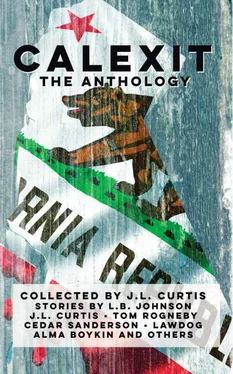She thought of her first whitetail hunt, taught the craft by those that loved her, passing down a tradition of survival and preparedness. She field-dressed the animal with coaching but no hands on assistance, there in the fading light, her bloody hands consecrating to them that which was, by God’s will and man’s patience, accepted as a gift. She grew up that day, in more ways the one, having learned and watched and waited, until she was ready to handle her firearm, ready to use it as a responsible steward of the land, looking at the deer on the ground, the first precious blood she had been worthy to take. Sacrifice with grace, for which we are thankful and repentant.
The rainfall soon snubbed that recollection, memories growing quiet in the tears of the heavens. It would be a brief outburst so she stayed still, and quiet, there under a tree whose leaves were torn fabric against the rain. Given the weather she was thankful she had taken shelter away from the tree stand; semi-squatted on the ground on a tarp under the smallest trees she could find, as far away from the tall trees as possible.
From above a growing patch of blue and in the retreating army of cloud, a brief, violent crack. Was that lightning or a black powder rifle there up in the hills? There was no telling, but the sound broke an awkward pause in the day, and the landscape breathed again. A bird twittered, and from below her, squirrels argued politics as the dome of perfect blue settled back over the earth, the breeze gentle and uninterrupted by moisture. She smiled, and quietly got back up in her blind, slumped back against the tree with the posture of survivors at the end of a crisis. The storm had passed.
She pulled her firearm out from where it had been kept dry, for no amount of fire or rain could challenge what was stored in a hunter’s ghostly heart, and her firearm had seen her through both, with neither pity nor scorn for the travails. We waited, the Winchester and she, and waited some more, hoping that with the clearing of the air, man’s smell washed from the area, a few deer would roust themselves out before dark.
All things come to he who waits. And she.
For there, as the sun started to yawn and dip in the sky, a buck passed by. He was young, still with much life ahead of him. Not a fat doe, but a youth, a skinny forest hooligan, tempting fate by being out past his curfew. She raised her weapon. The squirrels paused, and for yet another moment that day, the forest missed a breath, her hands coming up, shivering stopped, only blood and desire and life pulsing in her ear, her own breath waiting, trembling, held in as her finger drew back.
And she gently released it, the little buck bolting off into the shadows. She was hunting alone. If she had taken the shot she’d get a little bit of additional venison to add to the freezer but there was a good chance with the location combined with the onset of dark, that she would not be able to get him dressed and out of there before all light was gone.
We all take paths that seem exciting at the time, as we travel the wilderness of a heart, of a landscape. Everything is as it seems to be, you’re not mindful of the dangers. Yet sometimes, the sky clears, you look carefully at where you’re at, and realize the wisest thing to do is to walk away, clean and with as little blood as possible.
They say that the waters of the Lord can wash away sins, that mountain water cleanses the earth. But what of weakness and regret? What of that one moment of pity for that we are about to diminish, there in that cracking moment when something ceases to live. That moment there between speed and splendor and the casting off of a shell casing. Her family had lived off of the land, and as such, by need or necessity, she had taken life to feed them. Yet that night at the hunting cabin by herself could not, for reasons beyond the logical ones.
The rain was letting off to thin drops that trailed like dew upon her brow, but it was almost pitch dark before the trail led her back to the cabin, with thoughts of warmth and food, refreshing tonic to her brain, the smell of kerosene and leather bringing heat to parts of her too long cold. She peeled off her damp clothes, a strand of long red hair plastered to her breast like warriors paint, hands gathering wood and tinder into flame, fingers still damp with glistening drops.
Another crack of thunder split the night, and somewhere tonight, blood, hot and dense, bringing both pleasure and pain, would soak into the ground, starting the cycle of life again. From the woods, a cry of an animal lingered long on the air, leaving on the breeze the thin echo of regret. Tonight, a small whitetail lives another day, as does she.
She poured a glass of whisky from the bottle she knew her uncle had hidden away and raised a quiet toast to the night.
It’s hard to believe that’s been almost 10 years ago and now she lives here in that little log home.
She hadn’t continued her work as a Veterinary Technician when she moved up to the cabin full-time, not wanting to make the commute into town in the winter’s deep snow. Grooming some of the locals’ pets in what used to be a shop off the horse barn that had room for some deep sinks and boarding a few horses covered her basic expenses and insurance, the small cabin, and used truck being paid for. She still has a small fireproof box safely hidden inside that held a few thousand U.S. dollars, essential if she needs to make a break for Nevada.
But for now, she has game in the forest, and a bit of a garden hidden away by her horse’s barn. She has enough grains, sugar, and salt for a couple of years, provisions her grandmother had taught her were vital no matter how rich your lifestyle seemed to be.
Her stores will be crucial, for according to the local radio station, before it went off the air, within just a couple of weeks locals had broken into the Meadowvale grocers, looting its contents, leaving just the shattered shell of a once proud family-owned store.
* * *
Her only close neighbors, a young couple, usually kept just enough food for a week, venturing into town for munchies when the mood struck. She had tried to be cordial when she moved in, even going over one night to their house right by the main road, with cable and all the other fineries of living closer to town to let them know the coyotes were coming in a lot closer in the cold and letting them know that they might want to keep their appetizer sized dogs close by them rather than just letting them out to roam the open back yard.
The neighbor looked at Lisa and said, “It’s okay, we have an invisible fence.” Lisa couldn’t even BEGIN to explain the flaws in that reasoning to them. Good luck getting that collar on Mr. Mountain Lion. The world is not a safe and happy place, something some people find when they least expect it.
They were one of the first in the area to abandon this new “utopia” to flee down to the cities.
Look back into history, cities disappear, countries realign. Whole societies grind to a halt, the precise cause of death uncertain. The stars somehow align overhead by political alliance, high priests of nuclear ability, climate, and promise. All running like fault lines underneath what appears to be placid landscape. Disturbances ignored by the media as larger things erupt and spew black, cumulative movements unseen. The sheep graze placidly while the Tectonic plates of divergent cultures and religion, rub, shifting, jockeying for power until one day something gives way. A city will vanish, a state, perhaps an entire way of life lost as easily as a set of car keys.
We believe that because we’ve always been the dominant political and economic power on this planet that it will always be so. Legions nod in affirmation to change and power shifts, believing that because it always has been, it always will be. For so many years we lived as a nation on credit, buying with plastic, borrowing on faith. Her grandparents paid cash for everything, not expecting their government or their neighbor to bail them out, and as such, they survived the Great Depression. Her mom and dad had the same mindset. If it was broken they fixed it. If they worked hard to earn it, they took care of it.
Читать дальше










